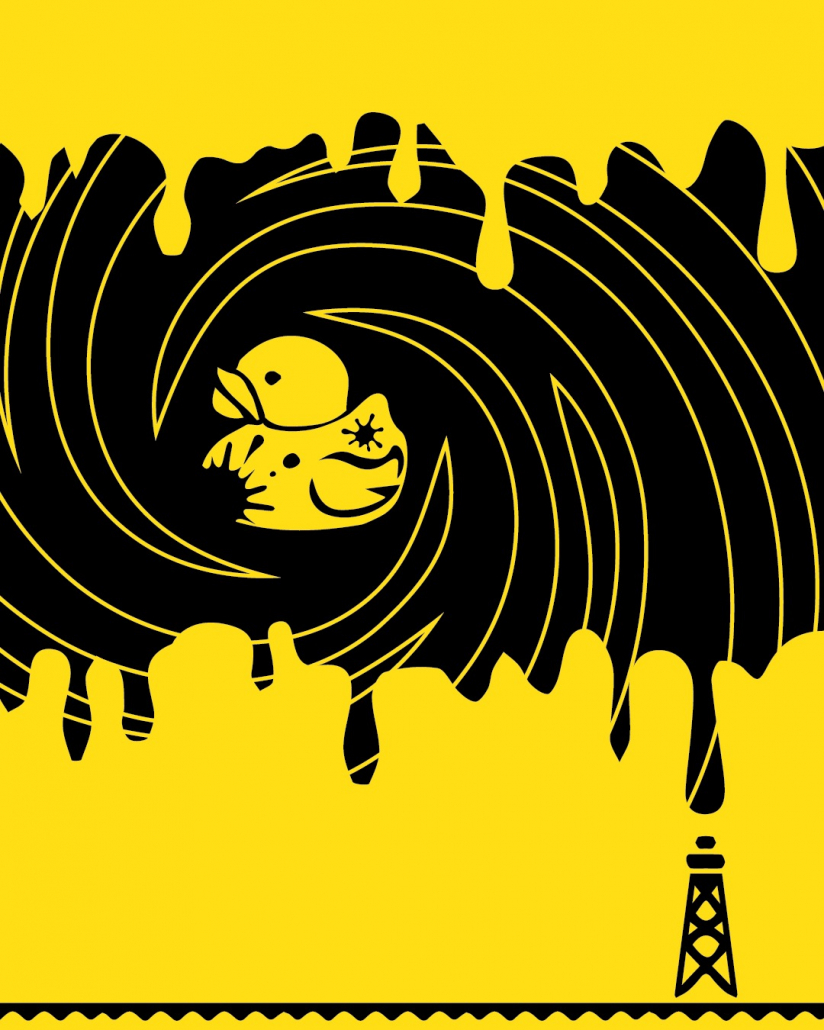Triple Bottom Line: It’s time to start crying over spilled oil
Odds are you probably caught a glimpse of the apocalyptic-looking oil spill in the Yucatán Peninsula over the summer, which was caused by an underwater oil pipeline bursting and natural gas bubbling to the surface. Consequently, electric shocks from a storm sparked the ocean’s surface into flames.
If this hellish event wasn’t on your radar, perhaps you caught the disaster last year in Mauritius, where a Japanese shipping vessel ran into a fragile coral reef and seeped nearly 1,000 tons of heavy oil into the Indian Ocean. Maybe you’ve read about the oil pipeline off the coast of Louisiana that ruptured due to Hurricane Ida, or the largest marine oil spill to date at the Deepwater Horizon rig in 2010, which seeped more than 300 Olympic-sized swimming pools worth of crude oil into the Gulf of Mexico.
Suffice to say, oil spills happen all the time. Thousands of spills occur each year around the world, some of which spill as little as a single barrel of oil but nonetheless cause environmental degradation and economic losses.
In my environmental studies classes, I hear the words “precautionary principle” thrown around a lot. Basically, this concept argues that action should be taken to prevent irreversible damage to the environment. While it admittedly sounds like wishful thinking, we’ve been given enough evidence as to what happens when we face a marine oil mishap. It’s time to stop retroactive regret and start prioritizing safety and environmental wellbeing over the potential profit of a dwindling resource.
Stopping things before they happen is a fairly logical argument, but let me take this one step further. We need to reduce our reliance on fossil fuels altogether — the less deep sea oil drilling we commit, the smaller the chance for a huge environmental disaster.
For a bit of background, petroleum companies set up huge sea platforms and drill deep into the seafloor to extract pockets of crude oil and natural gas. The collected fossil fuels are ultimately refined into a state which can be used to meet the world’s energy needs.
Oil spills can occur at any point along the petroleum extraction and refinement process. Oil slicks are at the mercy of the weather and currents, and they can be broken apart or spread far from their source. As the sheen breaks apart, some of the oil breaks down and deposits on the seafloor while microbes break down the rest.
As a result, spilt petroleum pollutes water with toxins and metals, lowers oxygen levels, blocks sunlight and drastically degrades water quality as a whole. While the damage can vary, oil spills contribute to toxic marine and air pollution — marine life can become asphyxiated, coral reefs can become stressed and commercially important species can become too contaminated for consumption.
Oil can contaminate drinking water supplies and threaten local fishermen’s livelihoods when the water is too oily for revenue-generating activities. This could potentially decimate the economies of tropical getaways such as Mauritius, when their main tourist attractions become inundated with a sheen of iridescent oil. Additionally, human health risks associated with oil spills may include respiratory damage, decreased immunity and increased risks of cancer.
11 years after Deepwater Horizon and $10 billion later, the National Oceanic and Atmospheric Administration and other federal and Gulf state partners are still actively working to restore the area by supporting local species and strengthening marshes, beaches and other critical habitats. While chemical dispersants siphon away much of the visible petroleum, cleaning efforts can have detrimental effects too. Chemicals can enter food chains, and methods such as floating booms, microbes and inorganic sorbents simply do not guarantee the eradication of every last drop of oil.
Burning the oil layer on top of the water is a more controversial method of oil removal, since this causes more air pollution and fails to address sinking oil. Cleaning strategies can also be exacerbated by local environmental conditions such as temperature, currents and weather.
The domestic and international economic impacts on marine markets and the long-term health consequences aren’t going away anytime soon — we need to quit while we’re ahead and stop retroactively learning about the numerous repercussions of oil spills.
Marinas and bays have implemented rules for boaters to prevent individual oil spills and leaks, including routine oil storage tank inspections and proper disposal and recycling of used oil and filters. Post-Deepwater Horizon, a Bureau of Safety and Environmental Enforcement was created to oversee and enforce offshore drilling safety and establish better protocols to be more prepared to address future spills.
However, installing more secure drilling technology or calculating a shipping route far from sensitive marine areas are just performative band-aids on a much bigger problem. The ocean is an interconnected ecosystem, and regardless of where energy companies sail or what kind of machinery they use, marine organisms will still be at risk. To circle back to my initial argument, the core of the issue lies within big petroleum-drilling corporations, not individual fossil fuel users.
But how can our society move away from the petroleum industry? The truth is, it doesn’t seem realistic or economically viable,at least in the near future. Transitioning all of society to an entirely new source of fuel — and essentially economy — requires levels of change over time. Although we’ve already moved from coal to “cleaner burning” fossil fuels such as petroleum and natural gas, we still have a long way to go.
Many tout natural gas as the perfect “bridge fuel” — that is, a relatively clean-burning fossil fuel that will sustain us as we continue to perfect technology and move toward a greater reliance on renewables.
However, the longer we rely on the extraction of any kind of fossil fuel, the deeper the grave we’re digging for ourselves. It’s difficult to strike a balance of moving away from fossil fuels while developing and refining renewable technologies, but the more energy and money we devote to improving renewable technologies, the more we will be able to accommodate energy needs.
While implementation of any sort is difficult because of a lack of effective international environmental oversight, any country would do well to prioritize investment in renewable energy technology improvement. By actively moving away from fossil fuels — and acknowledging that bridge fuels are nothing but capitalist propaganda to continue reliance on nonrenewables — we’re ensuring better energy security and accessibility, prioritizing our own health and improving the health of marine ecosystems.
With the increasing pressures of climate change — most notably, the increasing strength of hurricanes in the Gulf — we need to recognize the insubstantiality of the oil drilling industry and start making changes now.
Montana Denton is a senior writing about environmental issues, sustainability and society. Her column, “Triple Bottom Line,” runs every other Wednesday.


